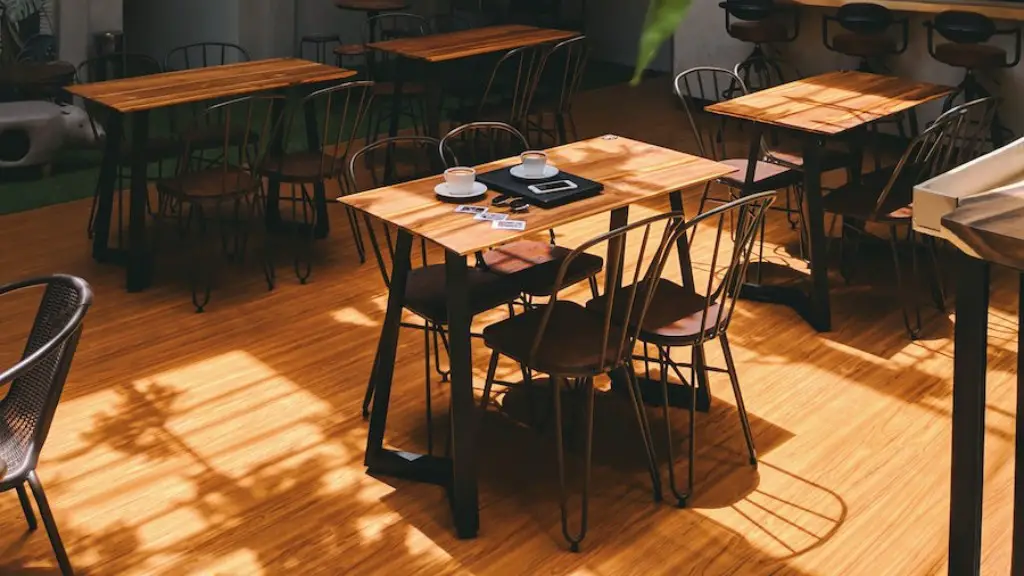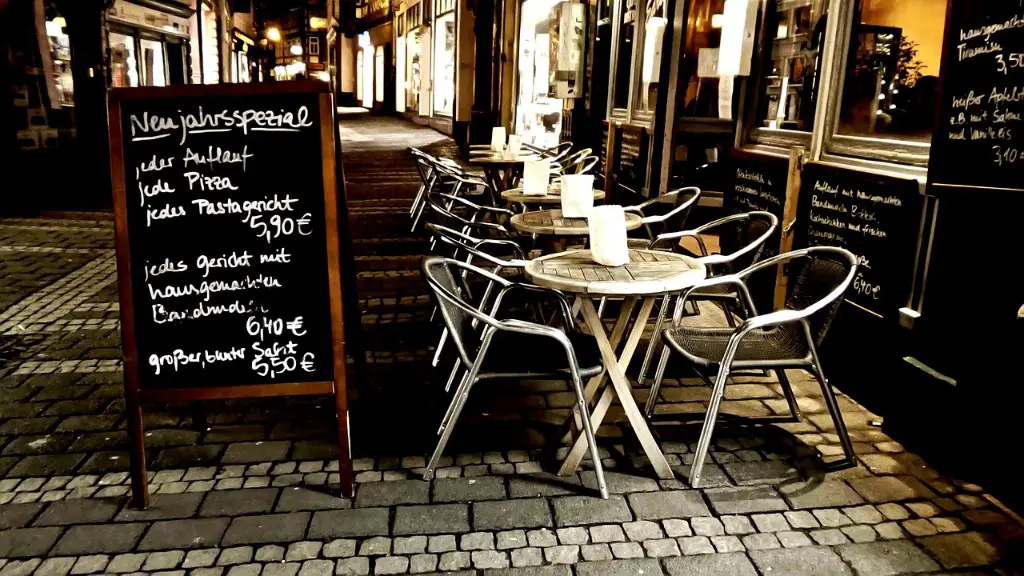When it comes to opening a restaurant, there are many things to consider. Location is key – you want to be in a spot that is convenient for customers and has good foot traffic. You’ll also need to decide on a concept, choose a menu, and price your dishes accordingly. Of course, you’ll need to secure funding and obtain the necessary permits and licenses. But with careful planning and execution, opening a small restaurant can be a rewarding experience.
1. Research the restaurant industry and your local market. Decide what type of restaurant you want to open and what type of food you want to serve.
2. Develop a business plan for your restaurant. This should include a marketing plan and financial projections.
3. Find a good location for your restaurant. The location should be convenient for your target customers and have enough space to accommodate your kitchen and dining area.
4. Get the necessary licenses and permits for your restaurant. This may include a food handling license, a liquor license, and a business license.
5. Hire a good kitchen staff and front of house staff. Train your employees in food safety and customer service.
6. Promote your restaurant through advertising and word of mouth. Offer special deals and promotions to attract customers.
7. Evaluate your restaurant’s performance regularly. Make changes to improve your business.
How much money do I need to start a restaurant business?
If you’re thinking about opening your own restaurant, it’s important to know that the startup costs can vary widely. They can range from $175,500 to $750,000, so it’s important to do your research and understand what you’ll need to budget for.
One way to reduce these costs is to use the ghost kitchen method, which is becoming increasingly popular. This is where you set up a kitchen in a space that’s not open to the public, which can help you save on things like rent and build-out costs.
If the high startup costs are discouraging, remember that there are ways to reduce them. Do your research and explore all your options so you can find the best solution for your restaurant.
The average startup cost for a restaurant can vary greatly depending on a number of factors such as location, equipment, furniture, and rent. In general, the cost to open a restaurant can range from as little as $175,000 to well over $700,000. However, it is important to keep in mind that these costs can vary greatly depending on the specific business and location.
Can you start a small restaurant with 10000 dollars
If you’re looking to start a ghost kitchen, you can expect to spend between $10,000 and $50,000 on startup costs. However, in some cities you may be able to find local providers who offer options for less than $10,000.
If you’re looking to open a restaurant in Michigan, you’ll need to obtain a few different licenses. First, you’ll need a business license. Then, you’ll need a certificate of occupancy from the city or county in which your restaurant will be located. Additionally, you’ll need a food handler’s license, also known as a food service license, from the Michigan Department of Health and Human Services. Finally, if you’re planning on serving alcohol, you’ll need to obtain a liquor license permit from the Michigan Liquor Control Commission. Additionally, all food service establishments in Michigan must obtain a food facility health permit from the Michigan Department of Agriculture and Rural Development. Finally, all buildings in which food is prepared and served must obtain a health permit from the Michigan Department of Health and Human Services.
Do you need a Licence to run a restaurant?
If you are planning on opening a restaurant, you will need to register it with your local authority. Registration is free, and you can do it up to 28 days before your restaurant is set to open. Keep in mind that your registration can not be refused.
There is no one answer to the question of whether or not restaurants are profitable. The answer depends on a number of factors, including the size and type of restaurant, as well as economic conditions.
It is typically difficult for a new restaurant to turn a profit within the first two years of operation. This is due to the high start-up costs associated with opening a new business, such as rent, equipment, and staff. However, once a restaurant is established, it can be quite profitable. The profit margin for restaurants is typically low, however, so even a small decrease in sales can have a big impact on the bottom line.
Is it cheaper to build or buy a restaurant?
If you are looking to purchase an existing restaurant, it is important to consider the financials of the business. Depending on the financial situation of the restaurant, you may be able to acquire the business for much less than the cost of building a new one from scratch. This is something to keep in mind when considering your options for starting a new restaurant business.
There is a very broad range of salaries for restaurant owners, depending on a number of factors such as location, size, menu offerings, and amenities. On average, restaurant owners can see salary ranges from $33,000 a year to $155,000 a year. The location of the restaurant, the size of the restaurant, the menu offerings, and the amenities offered all play a role in determining the annual salary projection for a restaurant owner.
How much deposit do you need to buy a restaurant
A deposit of 30% or more is required by most lenders in order to process a successful application for a restaurant business loan. This is because the restaurant industry is considered to be high risk, and the lender wants to mitigate their risk as much as possible. In addition to the deposit, the lender will also need information such as your business plan, financial projections, and personal financial information. They will use this information to determine whether or not you are a good candidate for a loan and how much they are willing to lend you.
There are a few different types of restaurants that tend to be more profitable than others. Bars have some of the highest profit margins, as do delivery pizzerias and pasta restaurants. Food trucks can also be quite profitable, thanks to their low overhead costs.
What is the ghost kitchen method?
A ghost kitchen is a great option for a restaurant that wants to expand its delivery options without the high overhead costs of a traditional expansion. The kitchen is designed for efficiency and to cut unnecessary costs, so rent is low and you have your own private commercial kitchen space within a delivery hub. The only downside is that it can be difficult to expand your business further if you’re only cooking in a ghost kitchen.
Under the Cottage Food Law, non-potentially hazardous foods that do not require time and/or temperature control for safety can be produced in a home kitchen (the kitchen of the person’s primary domestic residence) for direct sale to customers at farmers markets, farm markets, roadside stands or other direct markets.
This law helps to promote entrepreneurship and allows for the sale of homemade foods that would otherwise not be able to be sold. This is a great way for people to start their own businesses and sell their products direct to customers.
Can you sell food without a license in Michigan
The Michigan Food Law of 2000 requires the licensing of any person or firm that processes, packs, cans, preserves, freezes, fabricates, stores, prepares, serves, sells, or offers food for sale. Some businesses are exempt, such as those selling low-risk items, such as prepackaged foods. Exemptions may also apply to businesses that sell food only occasionally or at farmers markets.
A business license is a document that gives you legal permission to operate a business. It is one of the most important restaurant licenses and permits. Without a business license, you would not be able to operate your business.
Can I cook at home and sell?
If you want to sell food from home, you need to take care of some legalities first. You need to register with environmental health and HMRC, and get the necessary training and paperwork. Otherwise, you’ll be fined heavily.
When starting a food business from home, it’s important to make sure you have all the necessary licenses and permissions in place. FSSAI license is one of the key requirements. You will also need a shop act license, health trade license, GST registration, and trademark registration for your brand. Without these licenses, you could run into trouble.
How much does it cost to setup a restaurant
A restaurant owner must decide on the capital needed to start a restaurant. The set-up cost of a decent-sized restaurant may take Rs 15 lakh to Rs 16 crore, depending on the menu, location, and other factors. The owner must have a clear understanding of how much money is needed to get the business off the ground and make it profitable. Otherwise, the business may fail and the investment will be lost.
There are a number of reasons why restaurants fail, but some of the most common include ignoring signs that the business is failing, or making a variety of mistakes. The restaurant failure rate is quite high, at 60% in the first year and 80% of restaurants don’t make it past four years. This is largely due to the fact that running a restaurant is hard work, and there are a lot of things that can go wrong. If you’re thinking of opening a restaurant, it’s important to be aware of the potential pitfalls so that you can try to avoid them.
Conclusion
There are many things to consider when opening a small restaurant business. First, you will need to develop a business plan. This should include your concept, target market, menu, and financial projections. You will also need to secure funding, which can come from personal savings, loans, or investors. Once you have the necessary start-up capital, you will need to find a location, build out or renovate the space, purchase restaurant equipment, and hire staff. There are many details involved in each of these steps, so it is important to do your research and consult with experts where necessary. With careful planning and execution, you can open a successful small restaurant business.
Opening a small restaurant business can be a great way to get your foot in the food industry door. However, there are a few things you should keep in mind. First, research the competition and make sure you have a niche that will make your restaurant stand out. Second, create a business plan and make sure you have the financial backing to get your business off the ground. Third, find the perfect location for your restaurant and make sure it is up to code. Lastly, hire a good staff that will work well together to give your customers the best experience possible. If you keep these things in mind, you will be well on your way to opening a successful small restaurant business.





